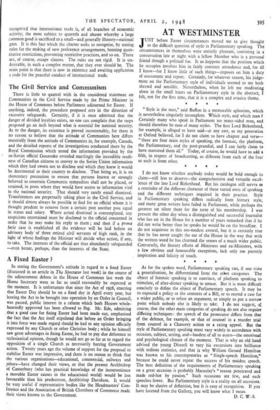The Civil Service and Communism
There is little to quarrel with in the considered statement on Communists in the Civil Service made by the Prime Minister in the House of Commons before Parliament adjourned for Easter. If anything, indeed, the procedure proposed errs in the direction of excessive safeguards. Certainly, if it is once admitted that the danger of divided loyalties exists, no one can complain that the steps proposed go an inch beyond what is essential for national security. As to the danger, its existence is proved incontestably, for there is no reason to believe that the attitude of Communists here differs materially from the attitude of Communists in, for example, Canada, and the detailed reports of the investigations conducted there by the Royal Commission which tested the information provided by the ex-Soviet official Gouzenko revealed startlingly the incredible readi- ness of Canadian citizens to convey to the Soviet Union information which they had sworn not to disclose and which they knew it would be detrimental to their country to disclose. That being so, it is an elementary precaution to ensure that persons known or strongly believed to entertain Communist sympathies shall not be placed, or retained, in posts where they would have access to information vital to the national security. That should very rarely entail dismissal. Transferences are perpetually taking place in the Civil Service, and it should almost always be possible to find for an official whom it is thought prudent to remove from a certain post another post equal in status and salary. Where actual dismissal is contemplated, any suspicions entertained must be disclosed to the official concerned in order that he may make his reply to them ; and then if a prima facie case is established all the evidence will be laid before an advisory body' of three retired civil servants of high rank, in the light of whose findings the Minister will decide what action, if any, to take. The interests of the official are thus abundantly safeguarded :—even better, perhaps, than the interests of the State.






























 Previous page
Previous page